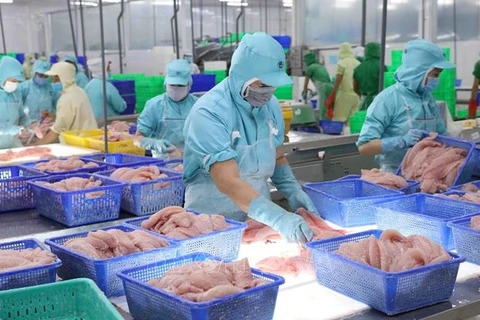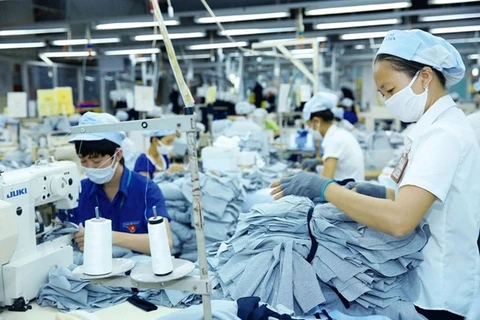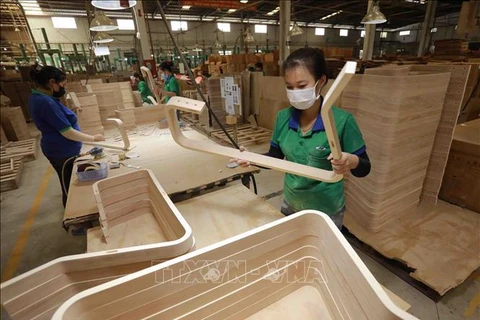Hanoi (VNA) – With noteworthy signs of recovery in the first two months of this year, the national economy is expected to bounce back quickly this year.
Vietnam faced a host of challenges last year, particularly in its economic landscape, with key driving forces enduring periods of stagnation. Moreover, due to difficulties arising from the decline in global market demand, its exports had experienced negative growth for the first time since 2009.
Statistics showed its total trade turnover in the year was estimated at 683 billion USD, a year-on-year decrease of 6.6%. Specifically, exports dropped by 4.4%, and imports down 8.9%.
However, the country earned up to 113.96 billion USD from exports-imports in the first two months of this year, a year-on-year rise of 18.6%, with exports up 19.2% and imports up 18%, and a trade surplus of 4.72 billion USD.
US firms excessively ordered “Made in Vietnam” products during the COVID-19 supply chain disruptions and then subsequently slashed their purchases last year to reduce their bloated inventories, according to Michael Kokalari, chief economist at investment fund VinaCapital.
Vietnam faced a host of challenges last year, particularly in its economic landscape, with key driving forces enduring periods of stagnation. Moreover, due to difficulties arising from the decline in global market demand, its exports had experienced negative growth for the first time since 2009.
Statistics showed its total trade turnover in the year was estimated at 683 billion USD, a year-on-year decrease of 6.6%. Specifically, exports dropped by 4.4%, and imports down 8.9%.
However, the country earned up to 113.96 billion USD from exports-imports in the first two months of this year, a year-on-year rise of 18.6%, with exports up 19.2% and imports up 18%, and a trade surplus of 4.72 billion USD.
US firms excessively ordered “Made in Vietnam” products during the COVID-19 supply chain disruptions and then subsequently slashed their purchases last year to reduce their bloated inventories, according to Michael Kokalari, chief economist at investment fund VinaCapital.
However, following the most aggressive pace of inventory destocking in over 10 years, that trend is now ending, and consequently Vietnam’s exports revived in January.
“We expect Vietnam’s export orders to continue increasing in the months ahead due to the surprising strength of the US economy, as evidenced by the highest level of US consumer confidence since the COVID reopening boom,” he said.
Besides, Vietnam's inventory also sharply decreased in the first month of this year. The Purchasing Managers' Index (PMI) rose, for the first time in four consecutive months, above the threshold of 50 points, reaching 50.3 points in January, turning itself a crucial driver of the domestic manufacturing sector.
Besides, Vietnam's inventory also sharply decreased in the first month of this year. The Purchasing Managers' Index (PMI) rose, for the first time in four consecutive months, above the threshold of 50 points, reaching 50.3 points in January, turning itself a crucial driver of the domestic manufacturing sector.
In the January-February period, the country’s index of industrial production (IIP) expanded by 5.7% year-on-year, compared to the decrease of 2.9% recorded in the same period last year.
Increased production implies higher income for labourers, providing strong support for consumer spending growth, and subsequently pushing manufacturing, business, and services.
According to the General Statistics Office under the Ministry of Planning and Investment, the total retail sales of goods and revenue from consumer services in the first two months reached 1.03 quadrillion VND (41.72 billion USD), up 8.1% month-on-month.
Notably, the foreign direct investment (FDI) influx continued to rise in the two months, hitting 2.8 billion USD, up 9.8% year-on-year, demonstrating strong confidence of foreign investors in the country’s economic potential.
Kokalari, however, forecast that Vietnam’s exports will continue to face challenges as global demand for goods could persist at low levels due to the ongoing high inflation.
At a recent meeting with the Co-operative Bank of Vietnam (Co-opBank), National Assembly Chairman Vuong Dinh Hue stressed that to achieve the socio-economic targets set for 2024 and the 2021-2025 period, it requires joint efforts by the Government, business and people, with the banking sector playing an important role.
The sector, therefore, was asked to improve its forecast ability, keep a close watch on the regional and global economic situation, especially energy prices, to devise appropriate money policies and ensure the harmony between reducing interest rates and stabilising exchange rates./.
Increased production implies higher income for labourers, providing strong support for consumer spending growth, and subsequently pushing manufacturing, business, and services.
According to the General Statistics Office under the Ministry of Planning and Investment, the total retail sales of goods and revenue from consumer services in the first two months reached 1.03 quadrillion VND (41.72 billion USD), up 8.1% month-on-month.
Notably, the foreign direct investment (FDI) influx continued to rise in the two months, hitting 2.8 billion USD, up 9.8% year-on-year, demonstrating strong confidence of foreign investors in the country’s economic potential.
Kokalari, however, forecast that Vietnam’s exports will continue to face challenges as global demand for goods could persist at low levels due to the ongoing high inflation.
At a recent meeting with the Co-operative Bank of Vietnam (Co-opBank), National Assembly Chairman Vuong Dinh Hue stressed that to achieve the socio-economic targets set for 2024 and the 2021-2025 period, it requires joint efforts by the Government, business and people, with the banking sector playing an important role.
The sector, therefore, was asked to improve its forecast ability, keep a close watch on the regional and global economic situation, especially energy prices, to devise appropriate money policies and ensure the harmony between reducing interest rates and stabilising exchange rates./.
VNA

























